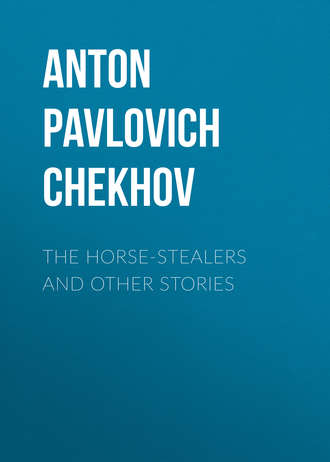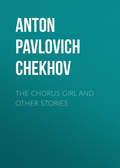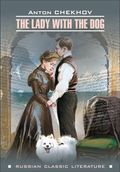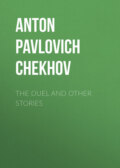
Антон Чехов
The Horse-Stealers and Other Stories
THE JEUNE PREMIER
YEVGENY ALEXEYITCH PODZHAROV, the jeune premier, a graceful, elegant young man with an oval face and little bags under his eyes, had come for the season to one of the southern towns of Russia, and tried at once to make the acquaintance of a few of the leading families of the place. "Yes, signor," he would often say, gracefully swinging his foot and displaying his red socks, "an artist ought to act upon the masses, both directly and indirectly; the first aim is attained by his work on the stage, the second by an acquaintance with the local inhabitants. On my honour, parole d'honneur, I don't understand why it is we actors avoid making acquaintance with local families. Why is it? To say nothing of dinners, name-day parties, feasts, soirées fixes, to say nothing of these entertainments, think of the moral influence we may have on society! Is it not agreeable to feel one has dropped a spark in some thick skull? The types one meets! The women! Mon Dieu, what women! they turn one's head! One penetrates into some huge merchant's house, into the sacred retreats, and picks out some fresh and rosy little peach – it's heaven, parole d'honneur!"
In the southern town, among other estimable families he made the acquaintance of that of a manufacturer called Zybaev. Whenever he remembers that acquaintance now he frowns contemptuously, screws up his eyes, and nervously plays with his watch-chain.
One day – it was at a name-day party at Zybaev's – the actor was sitting in his new friends' drawing-room and holding forth as usual. Around him "types" were sitting in armchairs and on the sofa, listening affably; from the next room came feminine laughter and the sounds of evening tea… Crossing his legs, after each phrase sipping tea with rum in it, and trying to assume an expression of careless boredom, he talked of his stage triumphs.
"I am a provincial actor principally," he said, smiling condescendingly, "but I have played in Petersburg and Moscow too… By the way, I will describe an incident which illustrates pretty well the state of mind of to-day. At my benefit in Moscow the young people brought me such a mass of laurel wreaths that I swear by all I hold sacred I did not know where to put them! Parole d'honneur! Later on, at a moment when funds were short, I took the laurel wreaths to the shop, and.. guess what they weighed. Eighty pounds altogether. Ha, ha! you can't think how useful the money was. Artists, indeed, are often hard up. To-day I have hundreds, thousands, tomorrow nothing… To-day I haven't a crust of bread, to-morrow I have oysters and anchovies, hang it all!"
The local inhabitants sipped their glasses decorously and listened. The well-pleased host, not knowing how to make enough of his cultured and interesting visitor, presented to him a distant relative who had just arrived, one Pavel Ignatyevitch Klimov, a bulky gentleman about forty, wearing a long frock-coat and very full trousers.
"You ought to know each other," said Zybaev as he presented Klimov; "he loves theatres, and at one time used to act himself. He has an estate in the Tula province."
Podzharov and Klimov got into conversation. It appeared, to the great satisfaction of both, that the Tula landowner lived in the very town in which the jeune premier had acted for two seasons in succession. Enquiries followed about the town, about common acquaintances, and about the theatre..
"Do you know, I like that town awfully," said the jeune premier, displaying his red socks. "What streets, what a charming park, and what society! Delightful society!"
"Yes, delightful society," the landowner assented.
"A commercial town, but extremely cultured… For instance, er-er-er.. the head master of the high school, the public prosecutor.. the officers… The police captain, too, was not bad, a man, as the French say, enchanté, and the women, Allah, what women!"
"Yes, the women.. certainly.."
"Perhaps I am partial; the fact is that in your town, I don't know why, I was devilishly lucky with the fair sex! I could write a dozen novels. To take this episode, for instance… I was staying in Yegoryevsky Street, in the very house where the Treasury is.."
"The red house without stucco?"
"Yes, yes.. without stucco… Close by, as I remember now, lived a local beauty, Varenka.."
"Not Varvara Nikolayevna?" asked Klimov, and he beamed with satisfaction. "She really is a beauty.. the most beautiful girl in the town."
"The most beautiful girl in the town! A classic profile, great black eyes.. and hair to her waist! She saw me in 'Hamlet,' she wrote me a letter à la Pushkin's 'Tatyana.'.. I answered, as you may guess.."
Podzharov looked round, and having satisfied himself that there were no ladies in the room, rolled his eyes, smiled mournfully, and heaved a sigh.
"I came home one evening after a performance," he whispered, "and there she was, sitting on my sofa. There followed tears, protestations of love, kisses… Oh, that was a marvellous, that was a divine night! Our romance lasted two months, but that night was never repeated. It was a night, parole d'honneur!"
"Excuse me, what's that?" muttered Klimov, turning crimson and gazing open-eyed at the actor. "I know Varvara Nikolayevna well: she's my niece."
Podzharov was embarrassed, and he, too, opened his eyes wide.
"How's this?" Klimov went on, throwing up his hands. "I know the girl, and.. and.. I am surprised.."
"I am very sorry this has come up," muttered the actor, getting up and rubbing something out of his left eye with his little finger. "Though, of course.. of course, you as her uncle."
The other guests, who had hitherto been listening to the actor with pleasure and rewarding him with smiles, were embarrassed and dropped their eyes.
"Please, do be so good.. take your words back." said Klimov in extreme embarrassment. "I beg you to do so!"
"If.. er-er-er.. it offends you, certainly," answered the actor, with an undefined movement of his hand.
"And confess you have told a falsehood."
"I, no.. er-er-er… It was not a lie, but I greatly regret having spoken too freely… And, in fact.. I don't understand your tone!"
Klimov walked up and down the room in silence, as though in uncertainty and hesitation. His fleshy face grew more and more crimson, and the veins in his neck swelled up. After walking up and down for about two minutes he went up to the actor and said in a tearful voice:
"No, do be so good as to confess that you told a lie about Varenka!
Have the goodness to do so!"
"It's queer," said the actor, with a strained smile, shrugging his shoulders and swinging his leg. "This is positively insulting!"
"So you will not confess it?"
"I do-on't understand!"
"You will not? In that case, excuse me.. I shall have to resort to unpleasant measures. Either, sir, I shall insult you at once on the spot, or.. if you are an honourable man, you will kindly accept my challenge to a duel… We will fight!"
"Certainly!" rapped out the jeune premier, with a contemptuous gesture. "Certainly."
Extremely perturbed, the guests and the host, not knowing what to do, drew Klimov aside and began begging him not to get up a scandal. Astonished feminine countenances appeared in the doorway… The jeune premier turned round, said a few words, and with an air of being unable to remain in a house where he was insulted, took his cap and made off without saying good-bye.
On his way home the jeune premier smiled contemptuously and shrugged his shoulders, but when he reached his hotel room and stretched himself on his sofa he felt exceedingly uneasy.
"The devil take him!" he thought. "A duel does not matter, he won't kill me, but the trouble is the other fellows will hear of it, and they know perfectly well it was a yarn. It's abominable! I shall be disgraced all over Russia.."
Podzharov thought a little, smoked, and to calm himself went out into the street.
"I ought to talk to this bully, ram into his stupid noddle that he is a blockhead and a fool, and that I am not in the least afraid of him.."
The jeune premier stopped before Zybaev's house and looked at the windows. Lights were still burning behind the muslin curtains and figures were moving about.
"I'll wait for him!" the actor decided.
It was dark and cold. A hateful autumn rain was drizzling as though through a sieve. Podzharov leaned his elbow on a lamp-post and abandoned himself to a feeling of uneasiness.
He was wet through and exhausted.
At two o'clock in the night the guests began coming out of Zybaev's house. The landowner from Tula was the last to make his appearance. He heaved a sigh that could be heard by the whole street and scraped the pavement with his heavy overboots.
"Excuse me!" said the jeune premier, overtaking him. "One minute."
Klimov stopped. The actor gave a smile, hesitated, and began, stammering: "I.. I confess.. I told a lie."
"No, sir, you will please confess that publicly," said Klimov, and he turned crimson again. "I can't leave it like that.."
"But you see I am apologizing! I beg you.. don't you understand? I beg you because you will admit a duel will make talk, and I am in a position… My fellow-actors.. goodness knows what they may think.."
The jeune premier tried to appear unconcerned, to smile, to stand erect, but his body would not obey him, his voice trembled, his eyes blinked guiltily, and his head drooped. For a good while he went on muttering something. Klimov listened to him, thought a little, and heaved a sigh.
"Well, so be it," he said. "May God forgive you. Only don't lie in future, young man. Nothing degrades a man like lying.. yes, indeed! You are a young man, you have had a good education.."
The landowner from Tula, in a benignant, fatherly way, gave him a lecture, while the jeune premier listened and smiled meekly… When it was over he smirked, bowed, and with a guilty step and a crestfallen air set off for his hotel.
As he went to bed half an hour later he felt that he was out of danger and was already in excellent spirits. Serene and satisfied that the misunderstanding had ended so satisfactorily, he wrapped himself in the bedclothes, soon fell asleep, and slept soundly till ten o'clock next morning.
A DEFENCELESS CREATURE
IN spite of a violent attack of gout in the night and the nervous exhaustion left by it, Kistunov went in the morning to his office and began punctually seeing the clients of the bank and persons who had come with petitions. He looked languid and exhausted, and spoke in a faint voice hardly above a whisper, as though he were dying.
"What can I do for you?" he asked a lady in an antediluvian mantle, whose back view was extremely suggestive of a huge dung-beetle.
"You see, your Excellency," the petitioner in question began, speaking rapidly, "my husband Shtchukin, a collegiate assessor, was ill for five months, and while he, if you will excuse my saying so, was laid up at home, he was for no sort of reason dismissed, your Excellency; and when I went for his salary they deducted, if you please, your Excellency, twenty-four roubles thirty-six kopecks from his salary. 'What for?' I asked. 'He borrowed from the club fund,' they told me, 'and the other clerks had stood security for him.' How was that? How could he have borrowed it without my consent? It's impossible, your Excellency. What's the reason of it? I am a poor woman, I earn my bread by taking in lodgers. I am a weak, defenceless woman.. I have to put up with ill-usage from everyone and never hear a kind word.."
The petitioner was blinking, and dived into her mantle for her handkerchief. Kistunov took her petition from her and began reading it.
"Excuse me, what's this?" he asked, shrugging his shoulders. "I can make nothing of it. Evidently you have come to the wrong place, madam. Your petition has nothing to do with us at all. You will have to apply to the department in which your husband was employed."
"Why, my dear sir, I have been to five places already, and they would not even take the petition anywhere," said Madame Shtchukin. "I'd quite lost my head, but, thank goodness – God bless him for it – my son-in-law, Boris Matveyitch, advised me to come to you. 'You go to Mr. Kistunov, mamma: he is an influential man, he can do anything for you..' Help me, your Excellency!"
"We can do nothing for you, Madame Shtchukin. You must understand: your husband served in the Army Medical Department, and our establishment is a purely private commercial undertaking, a bank. Surely you must understand that!"
Kistunov shrugged his shoulders again and turned to a gentleman in a military uniform, with a swollen face.
"Your Excellency," piped Madame Shtchukin in a pitiful voice, "I have the doctor's certificate that my husband was ill! Here it is, if you will kindly look at it."
"Very good, I believe you," Kistunov said irritably, "but I repeat it has nothing to do with us. It's queer and positively absurd! Surely your husband must know where you are to apply?"
"He knows nothing, your Excellency. He keeps on: 'It's not your business! Get away!' – that's all I can get out of him… Whose business is it, then? It's I have to keep them all!"
Kistunov again turned to Madame Shtchukin and began explaining to her the difference between the Army Medical Department and a private bank. She listened attentively, nodded in token of assent, and said:
"Yes.. yes.. yes.. I understand, sir. In that case, your Excellency, tell them to pay me fifteen roubles at least! I agree to take part on account!"
"Ough!" sighed Kistunov, letting his head drop back. "There's no making you see reason. Do understand that to apply to us with such a petition is as strange as to send in a petition concerning divorce, for instance, to a chemist's or to the Assaying Board. You have not been paid your due, but what have we to do with it?"
"Your Excellency, make me remember you in my prayers for the rest of my days, have pity on a lone, lorn woman," wailed Madame Shtchukin; "I am a weak, defenceless woman… I am worried to death, I've to settle with the lodgers and see to my husband's affairs and fly round looking after the house, and I am going to church every day this week, and my son-in-law is out of a job… I might as well not eat or drink… I can scarcely keep on my feet… I haven't slept all night.."
Kistunov was conscious of the palpitation of his heart. With a face of anguish, pressing his hand on his heart, he began explaining to Madame Shtchukin again, but his voice failed him.
"No, excuse me, I cannot talk to you," he said with a wave of his hand. "My head's going round. You are hindering us and wasting your time. Ough! Alexey Nikolaitch," he said, addressing one of his clerks, "please will you explain to Madame Shtchukin?"
Kistunov, passing by all the petitioners, went to his private room and signed about a dozen papers while Alexey Nikolaitch was still engaged with Madame Shtchukin. As he sat in his room Kistunov heard two voices: the monotonous, restrained bass of Alexey Nikolaitch and the shrill, wailing voice of Madame Shtchukin.
"I am a weak, defenceless woman, I am a woman in delicate health," said Madame Shtchukin. "I look strong, but if you were to overhaul me there is not one healthy fibre in me. I can scarcely keep on my feet, and my appetite is gone… I drank my cup of coffee this morning without the slightest relish.."
Alexey Nikolaitch explained to her the difference between the departments and the complicated system of sending in papers. He was soon exhausted, and his place was taken by the accountant.
"A wonderfully disagreeable woman!" said Kistunov, revolted, nervously cracking his fingers and continually going to the decanter of water. "She's a perfect idiot! She's worn me out and she'll exhaust them, the nasty creature! Ough!.. my heart is throbbing."
Half an hour later he rang his bell. Alexey Nikolaitch made his appearance.
"How are things going?" Kistunov asked languidly.
"We can't make her see anything, Pyotr Alexandritch! We are simply done. We talk of one thing and she talks of something else."
"I.. I can't stand the sound of her voice… I am ill
… I can't bear it."
"Send for the porter, Pyotr Alexandritch, let him put her out."
"No, no," cried Kistunov in alarm. "She will set up a squeal, and there are lots of flats in this building, and goodness knows what they would think of us… Do try and explain to her, my dear fellow.."
A minute later the deep drone of Alexey Nikolaitch's voice was audible again. A quarter of an hour passed, and instead of his bass there was the murmur of the accountant's powerful tenor.
"Re-mark-ably nasty woman," Kistunov thought indignantly, nervously shrugging his shoulders. "No more brains than a sheep. I believe that's a twinge of the gout again… My migraine is coming back.."
In the next room Alexey Nikolaitch, at the end of his resources, at last tapped his finger on the table and then on his own forehead.
"The fact of the matter is you haven't a head on your shoulders," he said, "but this."
"Come, come," said the old lady, offended. "Talk to your own wife like that… You screw!.. Don't be too free with your hands."
And looking at her with fury, with exasperation, as though he would devour her, Alexey Nikolaitch said in a quiet, stifled voice:
"Clear out."
"Wha-at?" squealed Madame Shtchukin. "How dare you? I am a weak, defenceless woman; I won't endure it. My husband is a collegiate assessor. You screw!.. I will go to Dmitri Karlitch, the lawyer, and there will be nothing left of you! I've had the law of three lodgers, and I will make you flop down at my feet for your saucy words! I'll go to your general. Your Excellency, your Excellency!"
"Be off, you pest," hissed Alexey Nikolaitch.
Kistunov opened his door and looked into the office.
"What is it?" he asked in a tearful voice.
Madame Shtchukin, as red as a crab, was standing in the middle of the room, rolling her eyes and prodding the air with her fingers. The bank clerks were standing round red in the face too, and, evidently harassed, were looking at each other distractedly.
"Your Excellency," cried Madame Shtchukin, pouncing upon Kistunov. "Here, this man, he here.. this man." (she pointed to Alexey Nikolaitch) "tapped himself on the forehead and then tapped the table… You told him to go into my case, and he's jeering at me! I am a weak, defenceless woman… My husband is a collegiate assessor, and I am a major's daughter myself!"
"Very good, madam," moaned Kistunov. "I will go into it.. I will take steps… Go away.. later!"
"And when shall I get the money, your Excellency? I need it to-day!"
Kistunov passed his trembling hand over his forehead, heaved a sigh, and began explaining again.
"Madam, I have told you already this is a bank, a private commercial establishment… What do you want of us? And do understand that you are hindering us."
Madame Shtchukin listened to him and sighed.
"To be sure, to be sure," she assented. "Only, your Excellency, do me the kindness, make me pray for you for the rest of my life, be a father, protect me! If a medical certificate is not enough I can produce an affidavit from the police… Tell them to give me the money."
Everything began swimming before Kistunov's eyes. He breathed out all the air in his lungs in a prolonged sigh and sank helpless on a chair.
"How much do you want?" he asked in a weak voice.
"Twenty-four roubles and thirty-six kopecks."
Kistunov took his pocket-book out of his pocket, extracted a twenty-five rouble note and gave it to Madame Shtchukin.
"Take it and.. and go away!"
Madame Shtchukin wrapped the money up in her handkerchief, put it away, and pursing up her face into a sweet, mincing, even coquettish smile, asked:
"Your Excellency, and would it be possible for my husband to get a post again?"
"I am going.. I am ill." said Kistunov in a weary voice.
"I have dreadful palpitations."
When he had driven home Alexey Nikolaitch sent Nikita for some laurel drops, and, after taking twenty drops each, all the clerks set to work, while Madame Shtchukin stayed another two hours in the vestibule, talking to the porter and waiting for Kistunov to return..
She came again next day.







